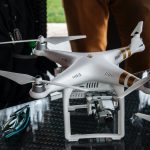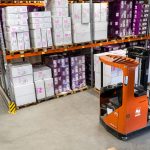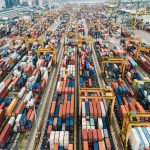From a mechanical standpoint, drones are simple machines. From a practical and economical one, their simple construction and small footprints are disproportionate to the value they provide. Drones are hard to beat when it comes to inspecting structures and studying how humans impact the natural world. Here are a few ways drones play interesting roles in inspections and more … [Read more...] about The Role of Drones for Inspections
Internet Of Things
The Internet of things is the connection between objects and machines through embedded technology. In these articles, we’ll explore everything vital you need to know about IoT.
The Role of 5G in Inventory Management
The supply chain is the backbone of virtually every industry. Businesses need timely, transparent shipments to meet their customers' needs, which means having a well-functioning, organized inventory system. At the same time, many stockpile practices fall short, but 5G networks could be the answer. Many store and factory inventories use manual methods to keep track of stock … [Read more...] about The Role of 5G in Inventory Management
Intelligent Automation for Enterprise IoT Solutions: How to Improve Business Processes with IA
Everyone in today's world, directly or indirectly, can touch the Intelligent Automation "sprouts": for instance, when launching a smart conditioning system that continuously controls the fresh air inside, or when buying vegetables from a smart farm. For the end-users, such cases are the one more digital catch that simplifies everyday life, while businesses, that implement these … [Read more...] about Intelligent Automation for Enterprise IoT Solutions: How to Improve Business Processes with IA
Digital Food Control Essential for Global Food Safety
Digital food control systems are the key to ensuring that safe and healthy food is accessible and affordable for everyone. Population growth and climate change threaten to push global food supplies to their limits in the years and decades ahead. Modern technology is essential to building an innovative food and agriculture supply chain. Advantages of Digital Food Control … [Read more...] about Digital Food Control Essential for Global Food Safety
Why IoT is not the solution to supply chain issues
The Internet of Things (IoT) was widely expected to herald a revolution in supply chain logistics and management. But the reality is not living up to the hype. More than 10 billion IoT devices around the world are constantly adding data to already overflowing data stores. Yet global supply chain disruption persists because it is not caused by a lack of data - which is why more … [Read more...] about Why IoT is not the solution to supply chain issues
What is the Internet of things?
The Internet of things, often abbreviated as IoT, is a system of interconnected devices and sensors that collect and exchange data. The data collected by these devices can be used to generate insights that can help businesses make better decisions and improve their operations.
For example, a company might use IoT data to optimize its production line or track its sales team’s performance. While IoT business intelligence is still in its early stages, it has the potential to revolutionize the way businesses operate. In the future, every company will need to have an IoT strategy to stay competitive. Want to learn more about the Internet of things? Datafloq has courses available. Contact us to get started.
How does the Internet of things work?
Collecting data from devices allows people to gain insights that can be used to improve efficiency and productivity. Additionally, the Internet of things can be utilized to monitor and control devices remotely.
The Internet of things and data analytics are two areas working together to change how we live and work. As more devices become connected to the Internet, the potential for data analytics to improve our lives will continue to grow.
How has the Internet of things impacted business?
IoT allows businesses to gather data about how their products are being used and how they can be improved. It also provides insights that can help businesses reduce costs, improve operations and create new revenue streams.
The Internet of things is still in its early stages, but it’s already having a big impact on business. As the technology matures, companies will be able to do even more with the vast amount of data that’s being generated by connected devices.
What is the Internet of things used for?
From everyday objects like microwaves and alarm clocks to more specialized equipment like fitness trackers and industrial machines, the Internet of things allows devices to communicate with each other and humans, exchanging data and carrying out tasks automatically.
In addition, the IoT can also help us manage our resources more efficiently. For instance, by tracking our energy usage and adjusting our heating and cooling systems accordingly, we can save money on utility bills. There are endless possibilities for how the IoT can be used to improve our lives.
Why is it called the Internet of things?
The terminology “Internet of things” was first coined by Kevin Ashton in 1999 while working on a project at MIT. The basic idea is that, in the future, everyday objects will be connected to the Internet and able to communicate with each other. For example, your fridge could automatically order more milk when running low, or your car could alert you if there’s an accident ahead.
What might the Internet of things do in the future?
While this may seem like a far-off futuristic concept, there are signs that the Internet of things is becoming a reality. For example, many new homes are being built with innovative technology that allows homeowners to control everything from the lights to their thermostats right on their phone. Ultimately, the Internet of things has the potential to revolutionize the way we live and work.







